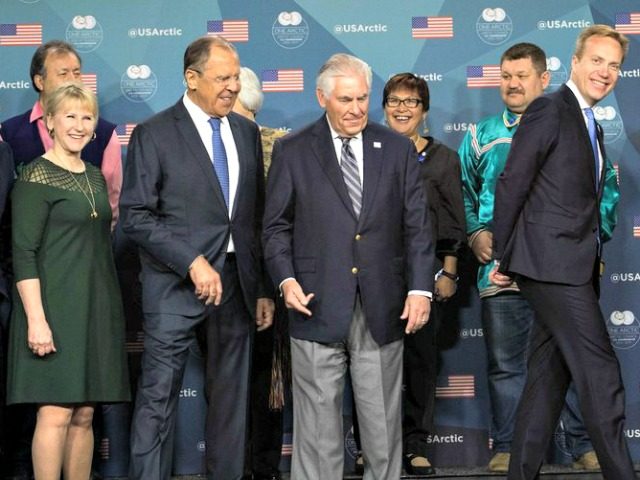As a member of the Arctic Council, the United States has signed onto two agreements that include efforts to protect the Arctic from climate change, linking it to human activity and calling on global efforts to reduce its effects, including enforcement of the Paris Agreement.
“The Arctic Council, which recently celebrated its 20th anniversary, has proven to be an indispensable forum in which we can pursue cooperation,” Tillerson said in remarks to the council. “I want to affirm that the United States will continue to be an active member in this council.”
“Foreign ministers of the eight Arctic States signed the third binding agreement negotiated under the auspices of the Arctic Council, the ‘Agreement on Enhancing International Arctic Scientific Cooperation,’ which will help to facilitate entry and exit of persons, equipment, and material; access to research infrastructure and facilities; access to research areas; the use of traditional and local knowledge; and education, career development, and training opportunities for students and early-career scientists,” the council press release said.
The ministers, including Tillerson, also signed the Fairbanks Declaration, which states, in part:
Reaffirming our commitment to the well-being of the inhabitants of the Arctic, to sustainable development and to the protection of the Arctic environment,
Recognizing the rights of Arctic indigenous peoples and the unique role of the Permanent Participants within the Arctic Council, as well as the commitment to consult and cooperate in good faith with Arctic indigenous peoples and to support their meaningful engagement in Arctic Council activities,
Acknowledging the contributions of local authorities, and the interests of all Arctic residents and communities in the work of the Arctic Council,
Further recognizing that activities taking place outside the Arctic region, including activities occurring in Arctic States, are the main contributors to climate change effects and pollution in the Arctic, and underlining the need for action at all levels,
Noting with concern that the Arctic is warming at more than twice the rate of the global average, resulting in widespread social, environmental, and economic impacts in the Arctic and worldwide, and the pressing and increasing need for mitigation and adaptation actions and to strengthen resilience,
Noting the entry into force of the Paris Agreement on climate change and its implementation, and reiterating the need for global action to reduce both long-lived greenhouse gases and short-lived climate pollutants.
The White House has not taken an official position yet as to whether it will stick with the Paris Agreement or withdraw, and Tillerson did not comment directly on the matter while in Alaska, the New York Times reported, despite his signing the document in favor of it.
“No decision is imminent, and in his remarks on Thursday, Mr. Tillerson presented the delay as necessary to gain the viewpoints of parties outside the White House and even outside the United States, including the other Arctic nations,” The Times reported.
“We are taking time to understand your concerns,” Tillerson told the members of the council, which in addition to the U.S. is comprised of Canada, Finland, Sweden, Denmark, Norway, Iceland, and Russia.
“But we’re not going to rush,” Tillerson said. “We’re going to work to make the right decision for the United States.”
“The council members approved, with little fuss, an agreement on scientific cooperation in the region,” The Times reported. “But the meeting’s closing statement, known as the Fairbanks Declaration, had been the subject of a flurry of last-minute negotiations on Wednesday.”
“We came here to Fairbanks believing that the declaration language was agreed,” Rene Soderman, the senior Arctic official for Finland, said, noting that the U.S. objected to some language, but that the overall council prevailed in its efforts.
“We were able to push the U.S. back as much as possible,” Soderman said. “And they were able to go back as much as possible.”
“It’s a decent declaration and contains all the essential issues for all the eight countries,” Soderman said.
Protesters were on hand at the venue chanting anti-Tillerson slogans, The Times reported, noting Tillerson’s previous job as CEO of ExxonMobil.
Terry Chapin, a climate scientist at the University of Alaska Fairbanks, was one of the protesters who is critical of the council’s need for unanimous decisions on matters.
“They’re constrained in the action they can take because they depend on the consensus from participating countries,” Chapin said. “So if the United States is not going to provide consensus on the climate action that’s needed, their hands are tied.
“I think we really need to speak to people like Tillerson to say that this is the kind of action that’s needed,” Chapin said.
“While the council only has the power to issue advisories, the language in the statement signed by Tillerson comes in stark contrast to statements and promises made by President Trump about climate change,” ABC reported, noting at the same time that Tillerson “endorsed” the Fairbanks Declaration.
The Associated Press describes the Arctic Council as “an advisory body that promotes cooperation among member nations and indigenous groups,” and a “focus is sustainable development and environmental protection of the Arctic.”
“It does not make policy or allocate resources, and its decisions must be unanimous,” according to AP.
The gathering marked the end of the two-year U.S. chairmanship of the council, which was passed on to Finland.

COMMENTS
Please let us know if you're having issues with commenting.